Unit 12 “Take Over, Bos’n!”课文翻译综合教程三
- 格式:doc
- 大小:71.50 KB
- 文档页数:5
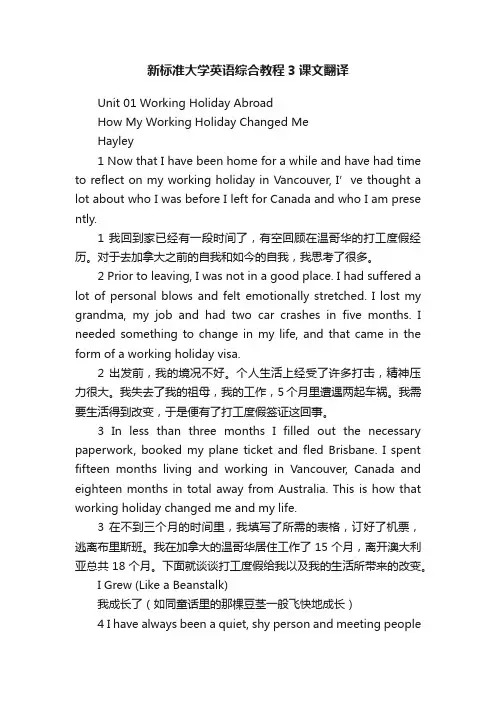
新标准大学英语综合教程3课文翻译Unit 01 Working Holiday AbroadHow My Working Holiday Changed MeHayley1 Now that I have been home for a while and have had time to reflect on my working holiday in Vancouver, I’ve thought a lot about who I was before I left for Canada and who I am prese ntly.1 我回到家已经有一段时间了,有空回顾在温哥华的打工度假经历。
对于去加拿大之前的自我和如今的自我,我思考了很多。
2 Prior to leaving, I was not in a good place. I had suffered a lot of personal blows and felt emotionally stretched. I lost my grandma, my job and had two car crashes in five months. I needed something to change in my life, and that came in the form of a working holiday visa.2 出发前,我的境况不好。
个人生活上经受了许多打击,精神压力很大。
我失去了我的祖母,我的工作,5个月里遭遇两起车祸。
我需要生活得到改变,于是便有了打工度假签证这回事。
3 In less than three months I filled out the necessary paperwork, booked my plane ticket and fled Brisbane. I spent fifteen months living and working in Vancouver, Canada and eighteen months in total away from Australia. This is how that working holiday changed me and my life.3 在不到三个月的时间里,我填写了所需的表格,订好了机票,逃离布里斯班。
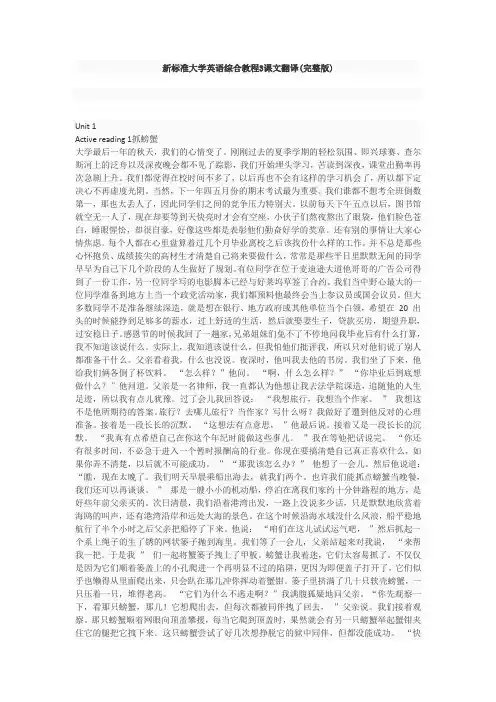
新标准大学英语综合教程3课文翻译(完整版)Unit 1Active reading 1抓螃蟹大学最后一年的秋天,我们的心情变了。
刚刚过去的夏季学期的轻松氛围、即兴球赛、查尔斯河上的泛舟以及深夜晚会都不见了踪影,我们开始埋头学习,苦读到深夜,课堂出勤率再次急剧上升。
我们都觉得在校时间不多了,以后再也不会有这样的学习机会了,所以都下定决心不再虚度光阴。
当然,下一年四五月份的期末考试最为重要。
我们谁都不想考全班倒数第一,那也太丢人了,因此同学们之间的竞争压力特别大。
以前每天下午五点以后,图书馆就空无一人了,现在却要等到天快亮时才会有空座,小伙子们熬夜熬出了眼袋,他们脸色苍白,睡眼惺忪,却很自豪,好像这些都是表彰他们勤奋好学的奖章。
还有别的事情让大家心情焦虑。
每个人都在心里盘算着过几个月毕业离校之后该找份什么样的工作。
并不总是那些心怀抱负、成绩拔尖的高材生才清楚自己将来要做什么,常常是那些平日里默默无闻的同学早早为自己下几个阶段的人生做好了规划。
有位同学在位于麦迪逊大道他哥哥的广告公司得到了一份工作,另一位同学写的电影脚本已经与好莱坞草签了合约。
我们当中野心最大的一位同学准备到地方上当一个政党活动家,我们都预料他最终会当上参议员或国会议员。
但大多数同学不是准备继续深造,就是想在银行、地方政府或其他单位当个白领,希望在20 出头的时候能挣到足够多的薪水,过上舒适的生活,然后就娶妻生子,贷款买房,期望升职,过安稳日子。
感恩节的时候我回了一趟家,兄弟姐妹们免不了不停地问我毕业后有什么打算,我不知道该说什么。
实际上,我知道该说什么,但我怕他们批评我,所以只对他们说了别人都准备干什么。
父亲看着我,什么也没说。
夜深时,他叫我去他的书房。
我们坐了下来,他给我们俩各倒了杯饮料。
“怎么样?”他问。
“啊,什么怎么样?”“你毕业后到底想做什么?”他问道。
父亲是一名律师,我一直都认为他想让我去法学院深造,追随他的人生足迹,所以我有点儿犹豫。
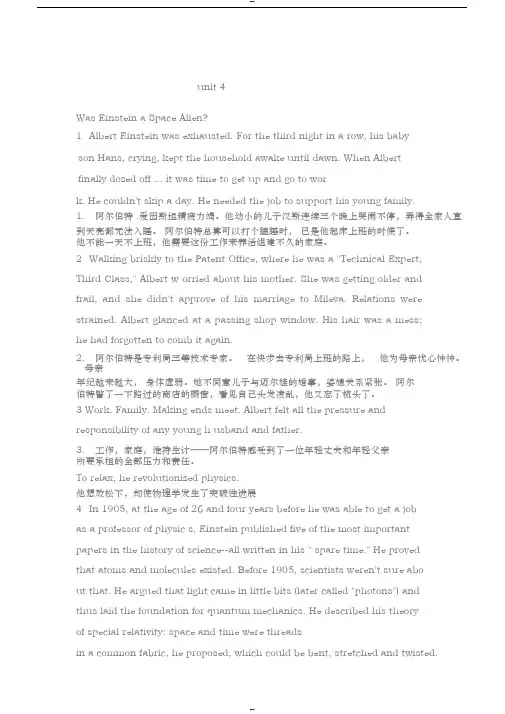
unit 4Was Einstein a Space Alien?1Albert Einstein was exhausted. For the third night in a row, his babyson Hans, crying, kept the household awake until dawn. When Albertfinally dozed off ... it was time to get up and go to work. He couldn't skip a day. He needed the job to support his young family.1.阿尔伯特 .爱因斯坦精疲力竭。
他幼小的儿子汉斯连续三个晚上哭闹不停,弄得全家人直到天亮都无法入睡。
阿尔伯特总算可以打个瞌睡时,已是他起床上班的时候了。
他不能一天不上班,他需要这份工作来养活组建不久的家庭。
2Walking briskly to the Patent Office, where he was a "Technical Expert,Third Class," Albert w orried about his mother. She was getting older andfrail, and she didn't approve of his marriage to Mileva. Relations were strained. Albert glanced at a passing shop window. His hair was a mess;he had forgotten to comb it again.2.阿尔伯特是专利局三等技术专家。
在快步去专利局上班的路上,他为母亲忧心忡忡。
母亲年纪越来越大,身体虚弱。
她不同意儿子与迈尔娃的婚事,婆媳关系紧张。
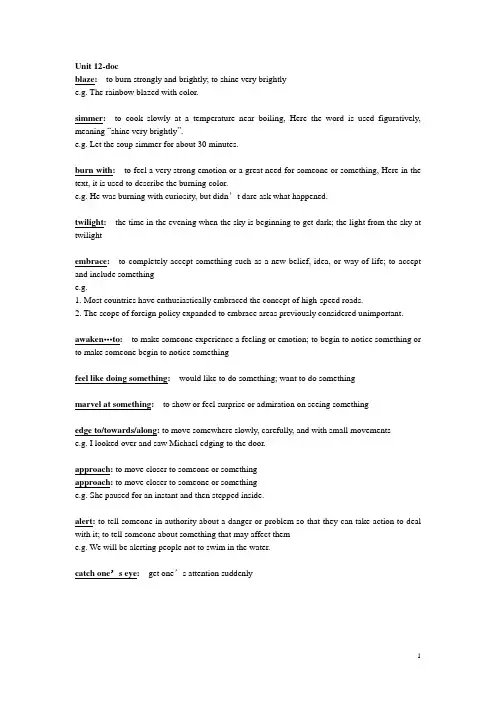
Unit 12-docblaze:to burn strongly and brightly; to shine very brightlye.g. The rainbow blazed with color.simmer:to cook slowly at a temperature near boiling, Here the word is used figuratively, meaning “shine very brightly”.e.g. Let the soup simmer for about 30 minutes.burn with:to feel a very strong emotion or a great need for someone or something, Here in the text, it is used to describe the burning color.e.g. He was burning with curiosity, but didn’t dare ask what happened.twilight:the time in the evening when the sky is beginning to get dark; the light from the sky at twilightembrace:to completely accept something such as a new belief, idea, or way of life; to accept and include somethinge.g.1. Most countries have enthusiastically embraced the concept of high-speed roads.2. The scope of foreign policy expanded to embrace areas previously considered unimportant.awaken…to:to make someone experience a feeling or emotion; to begin to notice something or to make someone begin to notice somethingfeel like doing something:would like to do something; want to do somethingmarvel at something:to show or feel surprise or admiration on seeing somethingedge to/towards/along:to move somewhere slowly, carefully, and with small movementse.g. I looked over and saw Michael edging to the door.approach:to move closer to someone or somethingapproach:to move closer to someone or somethinge.g. She paused for an instant and then stepped inside.alert:to tell someone in authority about a danger or problem so that they can take action to deal with it; to tell someone about something that may affect theme.g. We will be alerting people not to swim in the water.catch one’s eye:get one’s attention suddenlyScript of the DictationMost people love trees for their beauty, but trees are valuable in many practical ways, too. Wood from trees provides fuel for heating or cooking and lumber for houses, furniture, and tools. Trees produce most fruits and nearly all nuts. They supply many raw materials for industry. Trees also help preserve the land. The roots of trees keep soil from being washed or blown away. Thick carpets of leaves and roots on the ground soak up rainwater and keep it from draining rapidly into streams and rivers. Thus forests act as reservoirs of rainwater.。
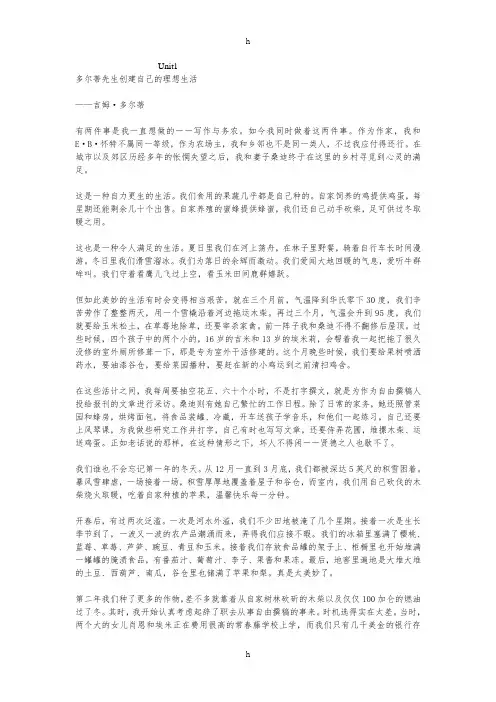
Unit1多尔蒂先生创建自己的理想生活——吉姆·多尔蒂有两件事是我一直想做的――写作与务农。
如今我同时做着这两件事。
作为作家,我和E·B·怀特不属同一等级,作为农场主,我和乡邻也不是同一类人,不过我应付得还行。
在城市以及郊区历经多年的怅惘失望之后,我和妻子桑迪终于在这里的乡村寻觅到心灵的满足。
这是一种自力更生的生活。
我们食用的果蔬几乎都是自己种的。
自家饲养的鸡提供鸡蛋,每星期还能剩余几十个出售。
自家养殖的蜜蜂提供蜂蜜,我们还自己动手砍柴,足可供过冬取暖之用。
这也是一种令人满足的生活。
夏日里我们在河上荡舟,在林子里野餐,骑着自行车长时间漫游。
冬日里我们滑雪溜冰。
我们为落日的余辉而激动。
我们爱闻大地回暖的气息,爱听牛群哞叫。
我们守着看鹰儿飞过上空,看玉米田间鹿群嬉跃。
但如此美妙的生活有时会变得相当艰苦。
就在三个月前,气温降到华氏零下30度,我们辛苦劳作了整整两天,用一个雪橇沿着河边拖运木柴。
再过三个月,气温会升到95度,我们就要给玉米松土,在草莓地除草,还要宰杀家禽。
前一阵子我和桑迪不得不翻修后屋顶。
过些时候,四个孩子中的两个小的,16岁的吉米和13岁的埃米莉,会帮着我一起把拖了很久没修的室外厕所修葺一下,那是专为室外干活修建的。
这个月晚些时候,我们要给果树喷洒药水,要油漆谷仓,要给菜园播种,要赶在新的小鸡运到之前清扫鸡舍。
在这些活计之间,我每周要抽空花五、六十个小时,不是打字撰文,就是为作为自由撰稿人投给报刊的文章进行采访。
桑迪则有她自己繁忙的工作日程。
除了日常的家务,她还照管菜园和蜂房,烘烤面包,将食品装罐、冷藏,开车送孩子学音乐,和他们一起练习,自己还要上风琴课,为我做些研究工作并打字,自己有时也写写文章,还要侍弄花圃,堆摞木柴、运送鸡蛋。
正如老话说的那样,在这种情形之下,坏人不得闲――贤德之人也歇不了。
我们谁也不会忘记第一年的冬天。
从12月一直到3月底,我们都被深达5英尺的积雪困着。
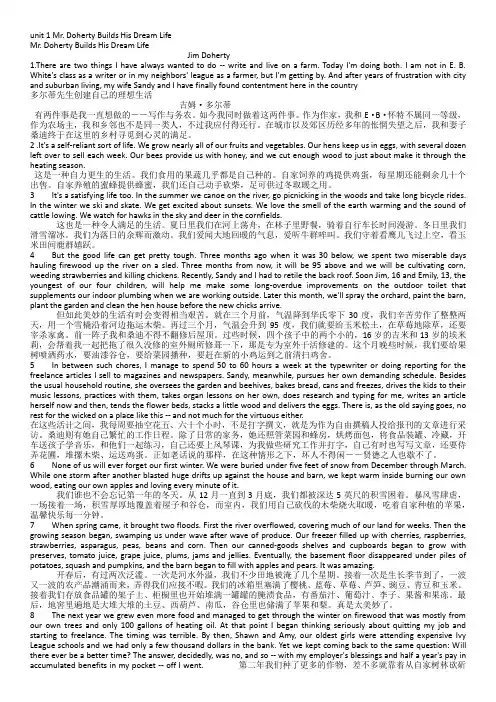
unit 1 Mr. Doherty Builds His Dream LifeMr. Doherty Builds His Dream LifeJim Doherty1.There are two things I have always wanted to do -- write and live on a farm. Today I'm doing both. I am not in E. B. White's class as a writer or in my neighbors' league as a farmer, but I'm getting by. And after years of frustration with city and suburban living, my wife Sandy and I have finally found contentment here in the country多尔蒂先生创建自己的理想生活吉姆·多尔蒂有两件事是我一直想做的――写作与务农。
如今我同时做着这两件事。
作为作家,我和E·B·怀特不属同一等级,作为农场主,我和乡邻也不是同一类人,不过我应付得还行。
在城市以及郊区历经多年的怅惘失望之后,我和妻子桑迪终于在这里的乡村寻觅到心灵的满足。
2 .It's a self-reliant sort of life. We grow nearly all of our fruits and vegetables. Our hens keep us in eggs, with several dozen left over to sell each week. Our bees provide us with honey, and we cut enough wood to just about make it through the heating season.这是一种自力更生的生活。
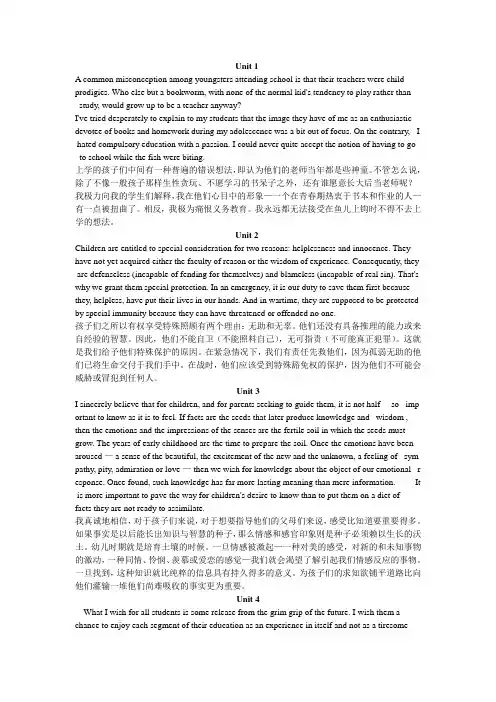
Unit 1A common misconception among youngsters attending school is that their teachers were child prodigies. Who else but a bookworm, with none of the normal kid's tendency to play rather than study, would grow up to be a teacher anyway?I've tried desperately to explain to my students that the image they have of me as an enthusiastic devotee of books and homework during my adolescence was a bit out of focus. On the contrary, I hated compulsory education with a passion. I could never quite accept the notion of having to go to school while the fish were biting.上学的孩子们中间有一种普遍的错误想法,即认为他们的老师当年都是些神童。
不管怎么说,除了不像一般孩子那样生性贪玩、不愿学习的书呆子之外,还有谁愿意长大后当老师呢?我极力向我的学生们解释,我在他们心目中的形象—一个在青春期热衷于书本和作业的人—有一点被扭曲了。
相反,我极为痛恨义务教育。
我永远都无法接受在鱼儿上钩时不得不去上学的想法。
Unit 2Children are entitled to special consideration for two reasons: helplessness and innocence. They have not yet acquired either the faculty of reason or the wisdom of experience. Consequently, they are defenseless (incapable of fending for themselves) and blameless (incapable of real sin). That's why we grant them special protection. In an emergency, it is our duty to save them first because they, helpless, have put their lives in our hands. And in wartime, they are supposed to be protected by special immunity because they can have threatened or offended no one.孩子们之所以有权享受特殊照顾有两个理由:无助和无辜。
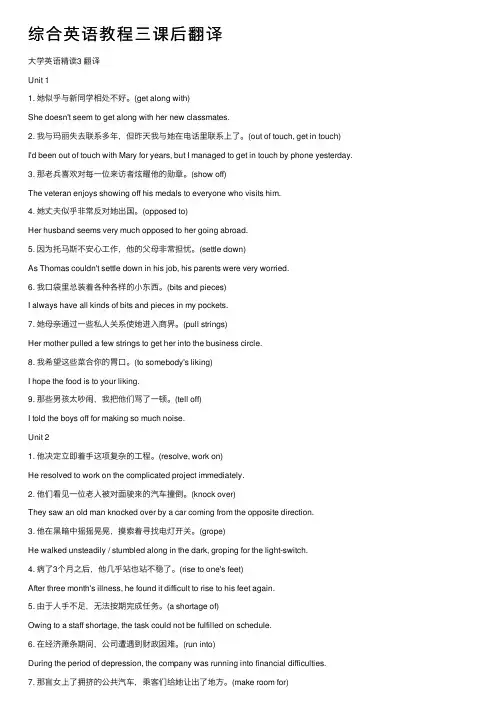
综合英语教程三课后翻译⼤学英语精读3 翻译Unit 11. 她似乎与新同学相处不好。
(get along with)She doesn't seem to get along with her new classmates.2. 我与玛丽失去联系多年,但昨天我与她在电话⾥联系上了。
(out of touch, get in touch)I'd been out of touch with Mary for years, but I managed to get in touch by phone yesterday.3. 那⽼兵喜欢对每⼀位来访者炫耀他的勋章。
(show off)The veteran enjoys showing off his medals to everyone who visits him.4. 她丈夫似乎⾮常反对她出国。
(opposed to)Her husband seems very much opposed to her going abroad.5. 因为托马斯不安⼼⼯作,他的⽗母⾮常担忧。
(settle down)As Thomas couldn't settle down in his job, his parents were very worried.6. 我⼝袋⾥总装着各种各样的⼩东西。
(bits and pieces)I always have all kinds of bits and pieces in my pockets.7. 她母亲通过⼀些私⼈关系使她进⼊商界。
(pull strings)Her mother pulled a few strings to get her into the business circle.8. 我希望这些菜合你的胃⼝。
(to somebody's liking)I hope the food is to your liking.9. 那些男孩太吵闹,我把他们骂了⼀顿。
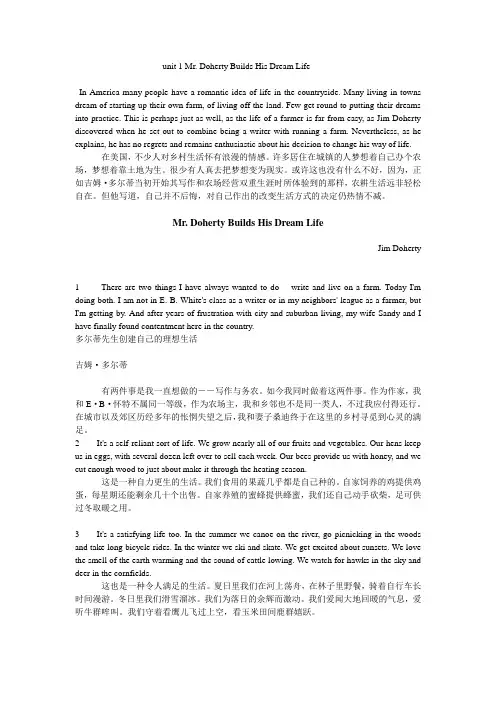
unit 1 Mr. Doherty Builds His Dream LifeIn America many people have a romantic idea of life in the countryside. Many living in towns dream of starting up their own farm, of living off the land. Few get round to putting their dreams into practice. This is perhaps just as well, as the life of a farmer is far from easy, as Jim Doherty discovered when he set out to combine being a writer with running a farm. Nevertheless, as he explains, he has no regrets and remains enthusiastic about his decision to change his way of life.在美国,不少人对乡村生活怀有浪漫的情感。
许多居住在城镇的人梦想着自己办个农场,梦想着靠土地为生。
很少有人真去把梦想变为现实。
或许这也没有什么不好,因为,正如吉姆·多尔蒂当初开始其写作和农场经营双重生涯时所体验到的那样,农耕生活远非轻松自在。
但他写道,自己并不后悔,对自己作出的改变生活方式的决定仍热情不减。
Mr. Doherty Builds His Dream LifeJim Doherty1 There are two things I have always wanted to do -- write and live on a farm. Today I'm doing both. I am not in E. B. White's class as a writer or in my neighbors' league as a farmer, but I'm getting by. And after years of frustration with city and suburban living, my wife Sandy and I have finally found contentment here in the country.多尔蒂先生创建自己的理想生活吉姆·多尔蒂有两件事是我一直想做的――写作与务农。
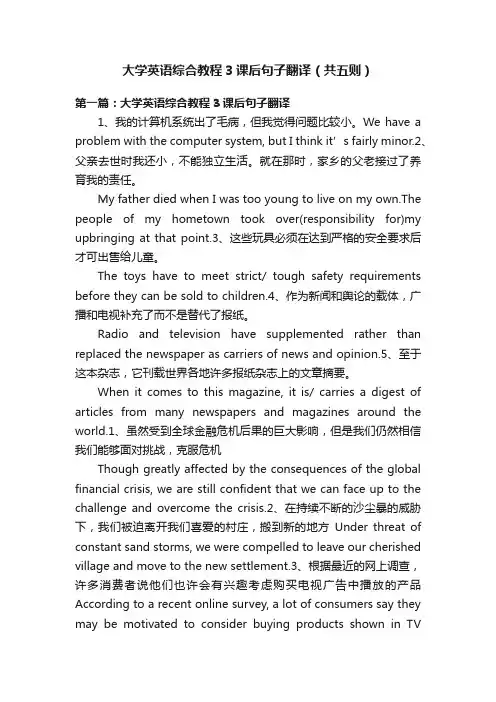
大学英语综合教程3课后句子翻译(共五则)第一篇:大学英语综合教程3课后句子翻译1、我的计算机系统出了毛病,但我觉得问题比较小。
We have a problem with the computer system, but I think it’s fairly minor.2、父亲去世时我还小,不能独立生活。
就在那时,家乡的父老接过了养育我的责任。
My father died when I was too young to live on my own.The people of my hometown took over(responsibility for)my upbringing at that point.3、这些玩具必须在达到严格的安全要求后才可出售给儿童。
The toys have to meet strict/ tough safety requirements before they can be sold to children.4、作为新闻和舆论的载体,广播和电视补充了而不是替代了报纸。
Radio and television have supplemented rather than replaced the newspaper as carriers of news and opinion.5、至于这本杂志,它刊载世界各地许多报纸杂志上的文章摘要。
When it comes to this magazine, it is/ carries a digest of articles from many newspapers and magazines around the world.1、虽然受到全球金融危机后果的巨大影响,但是我们仍然相信我们能够面对挑战,克服危机Though greatly affected by the consequences of the global financial crisis, we are still confident that we can face up to the challenge and overcome the crisis.2、在持续不断的沙尘暴的威胁下,我们被迫离开我们喜爱的村庄,搬到新的地方Under threat of constant sand storms, we were compelled to leave our cherished village and move to the new settlement.3、根据最近的网上调查,许多消费者说他们也许会有兴趣考虑购买电视广告中播放的产品According to a recent online survey, a lot of consumers say they may be motivated to consider buying products shown in TVcommercials.4、看到卡车司机把受污染的废弃物倒在河边,老人马上向警方报告Having spotted a truck driver dumping contaminated waste alongside the river, the old man reported to the police at once.5、一些科学家坚信人们总有一天会喜欢转基因农作物的,因为它们能够提高产量,帮助发展中国家战胜饥荒和疾病Some scientists hold to the firm conviction that people will come to like genetically modified crops someday since they can increase yields and help combat hunger and disease in the developing world.1、无论在城市还是在农村,因特网正在改变人们的生活方式。
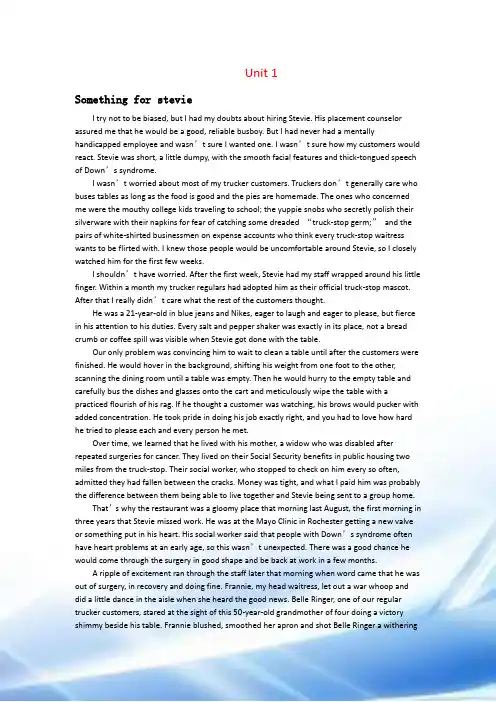
Unit 1Something for stevieI try not to be biased, but I had my doubts about hiring Stevie. His placement counselor assured me that he would be a good, reliable busboy. But I had never had a mentally handicapped employee and wasn’t sure I wanted one. I wasn’t sure how my customers would react. Stevie was short, a little dumpy, with the smooth facial features and thick-tongued speech of Down’s syndrome.I wasn’t worried about most of my trucker customers. Truckers don’t generally care who buses tables as long as the food is good and the pies are homemade. The ones who concerned me were the mouthy college kids traveling to school; the yuppie snobs who secretly polish their silverware with their napkins for fear of catching some dreaded “truck-stop germ;”and the pairs of white-shirted businessmen on expense accounts who think every truck-stop waitress wants to be flirted with. I knew those people would be uncomfortable around Stevie, so I closely watched him for the first few weeks.I shouldn’t have worried. After the first week, Stevie had my staff wrapped around his little finger. Within a month my trucker regulars had adopted him as their official truck-stop mascot. After that I really didn’t care what the rest of the customers thought.He was a 21-year-old in blue jeans and Nikes, eager to laugh and eager to please, but fierce in his attention to his duties. Every salt and pepper shaker was exactly in its place, not a bread crumb or coffee spill was visible when Stevie got done with the table.Our only problem was convincing him to wait to clean a table until after the customers were finished. He would hover in the background, shifting his weight from one foot to the other, scanning the dining room until a table was empty. Then he would hurry to the empty table and carefully bus the dishes and glasses onto the cart and meticulously wipe the table with a practiced flourish of his rag. If he thought a customer was watching, his brows would pucker with added concentration. He took pride in doing his job exactly right, and you had to love how hard he tried to please each and every person he met.Over time, we learned that he lived with his mother, a widow who was disabled after repeated surgeries for cancer. They lived on their Social Security benefits in public housing two miles from the truck-stop. Their social worker, who stopped to check on him every so often, admitted they had fallen between the cracks. Money was tight, and what I paid him was probably the difference between them being able to live together and Stevie being sent to a group home.That’s why the restaurant was a gloomy place that morning last August, the first morning in three years that Stevie missed work. He was at the Mayo Clinic in Rochester getting a new valve or something put in his heart. His social worker said that people with Down’s syndrome often have heart problems at an early age, so this wasn’t unexpected. There was a good chance he would come through the surgery in good shape and be back at work in a few months.A ripple of excitement ran through the staff later that morning when word came that he was out of surgery, in recovery and doing fine. Frannie, my head waitress, let out a war whoop and did a little dance in the aisle when she heard the good news. Belle Ringer, one of our regular trucker customers, stared at the sight of this 50-year-old grandmother of four doing a victory shimmy beside his table. Frannie blushed, smoothed her apron and shot Belle Ringer a witheringlook.9 He grinned. “OK, Frannie, what was that all about?”he asked.10 “We just got word that Stevie is out of surgery and going to be okay.”she responded.“I was wondering where he was,”said Belle. “I had a new joke to tell him. What was the surgery about?”12 Frannie quickly told him and the other two drivers sitting at his booth about Stevie’s surgery, then sighed. “Yeah, I’m glad he is going to be okay,”she said, “but I don’t know how he and his mom are going to handle all the bills. From what I hear, they’re barely getting byas it is.”Belle Ringer nodded thoughtfully, and Frannie hurried off to wait on the rest of her tables.After the morning rush, Frannie walked into my office. She had a couple of paper napkins in her hand and a funny look on her face. “What’s up?”I asked. “That table where Belle Ringer and his friends were sitting,”she said, “this was folded and tucked under a coffee cup.”She handed the napkin to me, and three $20 bills fell onto my desk when I opened it. On the outside, in big, bold letters, was printed “Something For Stevie.”“Pony Pete also asked me what that dance was all about,”she said, “so I told him about Stevie and his mom and everything, and Pete looked at Tony and Tony looked at Pete, and they ended up giving me this.”She handed me another paper napkin that had “Something For Stevie”scrawled on its outside. Two $50 bills were tucked within its folds. Frannie looked at me with wet, shiny eyes, shook her head and said simply, “Truckers.”15 That was three months ago. Today is Thanksgiving, the first day Stevie is supposed to be back to work. His placement worker said he’s been counting the days until the doctor said he could work, and it didn’t matter at all that it was a holiday. He called 10 times in the past week, making sure we knew he was coming, fearful that we had forgotten him or that his job was in jeopardy. I arranged to have his mother bring him to work. We met them in the parking lot and invited them both to celebrate his day back.Stevie was thinner and paler, but couldn’t stop grinning as he pushed through the doors and headed for the back room where his apron and busing cart were waiting. “Hold up there, Stevie, not so fast,”I said. I took him and his mother by their arms. “Work can wait for a minute. To celebrate you coming back, breakfast for you two is on me.”I led them toward a large corner booth at the rear of the room. I could feel and hear the rest of the staff following behind as we marched through the dining room. Glancing over my shoulder, I saw booth after booth of grinning truckers empty and join the procession.We stopped in front of the big table, its surface covered with a mess of coffee cups, saucers and dinner plates, all sitting crooked on dozens of folded paper napkins. “First thing you have to do, Stevie, is to clean up this mess,”I said, trying to sound stern. Stevie looked at me, and then at his mother, then pulled out one of the napkins. It had “Something for Stevie”written on the outside. As he picked it up, two $10 bills fell onto the table. Stevie stared at the money, then at dozens of napkins peeking from beneath the tableware, each with his name printed or scrawled on it.I turned to his mother. “There’s over $10,000 in cash and checks on that table, all from truckers and trucking companies that heard about your problems. Happy Thanksgiving!”Well, it got real noisy about that time, with everybody shouting, and there were a few tears, too. But you know what’s funny? While everybody else was busy shaking hands and hugging each other,Stevie, with a big, big smile on his face, was busy clearing all the cups and dishes from the table —the best worker I ever hired.送给史蒂维的一点心意1 我力求不存偏见,不过在雇用史蒂维时我有理由心存疑虑。
新概念英语第三册课文翻译及学习笔记:Lesson12【课文】Most of us have formed an unrealistic picture of life on a desert island.We sometimes imagine a desert island to be a sort of paradise where the sun always shines. Life there is simple and good. Ripe fruit falls from the trees and you never have to work. The other side of the picture is quite the opposite. Life on a desert island is wretched. You either starve to death or live like Robinson Crusoe, waiting for a boat which never comes. Perhaps there is an element of truth in both these pictures, but few us have had the opportunity to find out.Two men who recently spent five days on a coral island wished they had stayed there longer. They were taking a badly damaged boat from the Virgin Islands to Miami to have it repaired. During the journey, their boat began to sink. They quickly loaded a small rubber dinghy with food, matches, and cans of beer and rowed for a few miles across the Caribbean until they arrived at a tiny coral island. There were hardly any trees on the island and there was no water, but this did not prove to be a problem. The men collected rainwater in the rubber dinghy. As they had brought a spear gun with them, they had plenty to eat. They caught lobster and fish every day,and, as one of them put it 'ate like kings'. When a passing tanker rescued them five days later, both men were genuinely sorry that they had to leave.【课文翻译】我们很多人对于荒岛生活有一种不切实际的想法。
Unit 1Grammar Review1)I’ll borrow whichever tent you are not using now(你们现在不用的任何一顶帐篷).2)Free movie tickets will be given to whoever comes / come first(最早来的人们).3)We agreed to accept whichever/whatever condition our captain thought was the best(任何我们队长认为最佳的条件).4)Friends are forever comforts. Wherever / No matter where I go(无论我走到哪里)their care follows.5)It is neither possible nor sensible for parents to satisfy Whatever wishes their child/children expresses/express(孩子表达的任何愿望).6)However disappointed / No matter how disappointed you feel about the surroundings / environment / situation(不管你对环境有多么失望),you’re supposed to complain less and work more.7)Respect for the law is the foundation of a civilized society. Whoever breaks it(不管谁触犯法律)will be punished.8)David is in the habit of knitting his brows Whenever he concentrates on a problem(每当他集中精力思考问题的时候).Translation1) 以共同兴趣为基础的友谊是不容易破裂的。
unit 1 Mr. Doherty Builds His Dream LifeIn America many people have a romantic idea of life in the countryside. Many living in towns dream of starting up their own farm, of living off the land. Few get round to putting their dreams into practice. This is perhaps just as well, as the life of a farmer is far from easy, as Jim Doherty discovered when he set out to combine being a writer with running a farm. Nevertheless, as he explains, he has no regrets and remains enthusiastic about his decision to change his way of life.在美国,不少人对乡村生活怀有浪漫的情感。
许多居住在城镇的人梦想着自己办个农场,梦想着靠土地为生。
很少有人真去把梦想变为现实。
或许这也没有什么不好,因为,正如吉姆·多尔蒂当初开始其写作和农场经营双重生涯时所体验到的那样,农耕生活远非轻松自在。
但他写道,自己并不后悔,对自己作出的改变生活方式的决定仍热情不减。
Mr. Doherty Builds His Dream LifeJim Doherty1 There are two things I have always wanted to do -- write and live on a farm. Today I'm doing both. I am not in E. B. White's class as a writer or in my neighbors' league as a farmer, but I'm getting by. And after years of frustration with city and suburban living, my wife Sandy and I have finally found contentment here in the country. 多尔蒂先生创建自己的理想生活吉姆·多尔蒂有两件事是我一直想做的――写作与务农。
(Units 1-6)第一单元生活方式的改变课文A12 我想,不是所有热爱乡村的人都会乐意过我们这种生活的。
这种生活需要一些特殊素质。
其一是耐得住寂寞。
由于我们如此忙碌,手头又紧,我们很少请客。
在作物生长季节根本就没工夫参加社交活动。
吉米和埃米莉虽然参加学校的各种活动,但他俩大多数时间呆在家里。
13 另一项要求是体力——相当大的体力。
小范围里实现自给自足的途径是抵制诱惑,不去购置拖拉机和其它昂贵的节省劳力的机械。
相反,你要自己动手。
我们仅有的机器(不包括割草机)是一台3马力的小型旋转式耕耘机以及一架16英寸的链锯。
14 没人知道我们还能有精力在这里再呆多久一也许呆很长一阵子,也许不是。
到走的时候,我们会怆然离去,但也会为自己所做的一切深感自豪。
我们把农场出售也会赚相当大一笔钱。
我们自己在农场投入了约35,000美金的资金,要是现在售出的话价格差不多可以翻一倍。
不过现在不是出售的好时机。
但是一旦经济形势好转,对我们这种农场的需求又会增多。
15 但我们主要不是为了赚钱而移居至此的。
我们来此居住是因为想提高生活质量。
当我看着埃米莉傍晚去收鸡蛋,跟吉米一起在河上钓鱼,或和全家人一起在果园里享用老式的野餐,我知道,我们找到了自己一直在寻求的生活方式。
民权英雄课文A4 但此地只是我所承担的繁重使命的一处停留地。
乔赛亚·亨森只是一长串无所畏惧的男女名单中的一个名字,这些人共同创建了这条“地下铁路”,一个由逃亡线路和可靠的人家组成的用以解放美国南方黑奴的秘密网络。
在1820年至1860年期间,多达十万名黑奴经由此路走向自由。
5 2000年10月,克林顿总统批准拨款1600万美元建造全国“地下铁路”自由中心,以此纪念美国历史上第一次伟大的民权斗争。
中心计划于2004年在辛辛那提市建成。
真是该建立这样一个中心的时候了。
因为地下铁路的英雄们依然默默无闻,他们的业绩依然少人颂扬。
我要讲述他们的故事。
第三单元安全问题课文A锁之国鲍勃·格林4 取而代之的是防盗锁、防护链、电子报警系统,以及连接警署或私人保安公司的报警装置。
Chinese Translations of Texts A (Units 1-8)第一单元生活方式的改变课文A在美国,不少人对乡村生活怀有浪漫的情感。
许多居住在城镇的人梦想着自己办个农场,梦想着靠土地为生。
很少有人真去把梦想变为现实。
或许这也没有什么不好,因为,正如吉姆·多尔蒂当初开始其写作和农场经营双重生涯时所体验到的那样,农耕生活远非轻松自在。
但他写道,自己并不后悔,对自己作出的改变生活方式的决定仍热情不减。
多尔蒂先生创建自己的理想生活售姆·多尔蒂有两件事是我一直想做的——写作与务农。
如今我同时做着这两件事。
作为作家,我和E·B·怀特不属同一等级,作为农场主,我和乡邻也不是同一类人,不过我应付得还行。
在城市以及郊区历经多年的怅惘失望之后,我和妻子桑迪终于在这里的乡村寻觅到心灵的满足。
这是一种自力更生的生活。
我们食用的果蔬几乎都是自己种的。
自家饲养的鸡提供鸡蛋,每星期还能剩余几十个出售。
自家养殖的蜜蜂提供蜂蜜,我们还自己动手砍柴,足可供过冬取暖之用。
这也是一种令人满足的生活。
夏日里我们在河上荡舟,在林子里野餐,骑着自行车长时间漫游。
冬日里我们滑雪溜冰。
我们为落日的余辉而激动。
我们爱闻大地回暖的气息,爱听牛群哞叫。
我们守着看鹰儿飞过上空,看玉米田间鹿群嬉跃。
但如此美妙的生活有时会变得相当艰苦。
就在三个月前,气温降到华氏零下30度,我们辛苦劳作了整整两天,用一个雪橇沿着河边拖运木柴。
再过三个月,气温会升到95度,我们就要给玉米松土,在草莓地除草,还要宰杀家禽。
前一阵子我和桑迪不得不翻修后屋顶。
过些时候,四个孩子中的两个小的,16岁的吉米和13岁的埃米莉,会帮着我一起把拖了很久没修的室外厕所修葺一下,那是专为室外干活修建的。
这个月晚些时候,我们要给果树喷洒药水,要油漆谷仓,要给菜园播种,要赶在新的小鸡运到之前清扫鸡舍。
在这些活计之间,我每周要抽空花五、六十个小时,不是打字撰文,就是为作为自由撰稿人投给报刊的文章进行采访。
Unit 12“Take Over, Bos’n!”Oscar Schisgall1 Hour after hour I kept the gun pointed at the other nine men. From the lifeboat’s stern, where I’d sat most of the twenty days of our drifting, I could keep them all covered. If I had to shoot at such close qu arters, I wouldn’t miss. They realized that. Nobody jumped at me. But in the way they all glared I could see how they’d come to hate my guts.2 Especially Barrett, who’d been bos’n’s mate; Barrett said in his harsh, cracked voice, “You’re a fool, Snyder. Y-you can’t hold out forever! You’re half asleep now!”3 I didn’t answer. He was right. How long can a man stay awake? I hadn’t dared to shut my eyes in maybe seventy-two hours. Very soon now I’d doze off, and the instant that happened they’d jump on the li ttle water that was left.4 The last canteen lay under my legs. There wasn’t much in it after twenty days. Maybea pint. Enough to give each of them a few drops. Yet I could see in their bloodshot eyes that they’d gladly kill me for those few drops. As a man I didn’t count any more. I was no longer third officer4 of the wrecked Montala. I was just a gun that kept them away from the water they craved. And with their tongue swollen and their cheeks sunken, they were half crazy.5 The way I judged it, we must be some two hundred miles east of Ascension. Now that the storms were over, the Atlantic swells were long and easy, and the morning sun was hot –so hot it scorched your skin. My own tongue was thick enough to clog my throat. I’d have given the rest of my life for a single gulp of water.6 But I was the man with the gun — the only authority in the boat — and I knew this: once the water was gone we’d have nothing to look forward to but death. As long as we could look forward to getting a drink later, there was something to live for. We had to make it last as long as possible. If I’d given in to the curses, we’d have emptied the last canteen days ago. By now we’d all be dead.7 The men weren’t pulling on the oars. They’d stopped that long ago, too weak to go o n. The nine of them facing me were a pack of bearded, ragged, half-naked animals, and Iprobably looked as bad as the rest. Some sprawled over the gunwales, dozing. The rest watched me as Barrett did, ready to spring the instant I relaxed.8 When they were n’t looking at my face they looked at the canteen under my legs.9 Jeff Barrett was the nearest one. A constant threat. The bos’n’s mate was a heavy man, bald, with a scarred and brutal face. He’d been in a hundred fights, and they’d left their marks on him.10 Barrett had been able to sleep —in fact, he’d slept through most of the night – and I envied him that. His eyes wouldn’t close. They kept watching me, narrow and dangerous.11 Every now and then he taunted me in that hoarse, broken voice:12 “Why don’t you quit? You can’t hold out!”13 “Tonight,” I said. “We’ll ration the rest of the water tonight.”14 “By tonight some of us’ll be dead! We want it now!”15 “Tonight ,” I said.16 Couldn’t he understand that if we waited until night the few drops wouldn’t be sweated out of us so fast? But Barrett was beyond all reasoning. His mind had already cracked with thirst. I saw him begin to rise, a calculating look in his eyes. I aimed the gun at his chest – and he sat down again.17 I’d grabbed my Luger on inst inct, twenty days ago, just before running for the lifeboat. Nothing else would have kept Barrett and the rest away from the water.18 These fools —couldn’t they see I wanted a drink as badly as any of them? But I was in command here — that was the difference. I was the man with the gun, the man who had to think. Each of the others could afford to think only of himself; I had to think of them all.19 Barrett’s eyes kept watching me, waiting. I hated him. I hated him all the more because he’d slept. He had that advantage now. He wouldn’t keel over.20 And long before noon I knew I couldn’t fight any more. My eyelids were too heavy to lift. As the boat rose and fell on the long swells, I could feel sleep creeping over me like paralysis. I bent my head. It fil led my brain like a cloud. I was going, going …21 Barrett stood over me, and I couldn’t even lift the gun. In a vague way I could guess what would happen. He’d grab the water first and take his drop. By that time the others would be screaming and tearing at him, and he’d have to yield the canteen. Well, there was nothing more I could do about it.22 I whispered, “Take over, bos’n.”23 Then I fell face down in the bottom of the boat. I was asleep before I stopped moving…24 When a hand shook my shoulder, I could hardly raise my head. Jeff Barrett’s hoarse voice said, “Here! Take your share o’ the water!”25 Somehow I propped myself up on my arms, dizzy and weak. I looked at the men, andI thought my eyes were going. Their figures were dim, shadowy; but then I realized it wasn’t because of my eyes. It was night. The sea was black; there were stars overhead, I’d slept the day away.26 So we were in our twenty-first night adrift —the night in which the tramp Croton finally picked us up – but now, as I turned my head to Barrett there was no sign of any ship. He knelt beside me, holding out the canteen, his other hand with gun steady on the men.27 I stared at the canteen as if it were a mirage. Hadn’t they finished that pint of water this morning? When I looked u p at Barrett’s ugly face, it was grim. He must have guessed my thoughts.28 “You said, ‘Take over, bos’n,’ didn’t you?” he growled. “I’ve been holding off these apes all day.” He hefted the Luger in his hand. “When you’re boss-man,” he added, “in command and responsible for the rest — you —you sure get to see things different, don’t you?”“水手长,接手吧!”奥斯卡·希斯高尔1. 一小时又一小时,我用枪指着其他九个人。